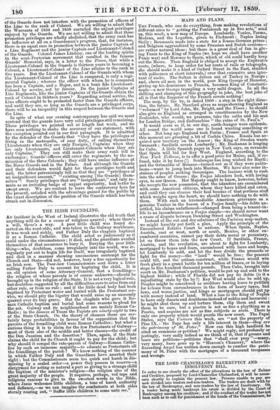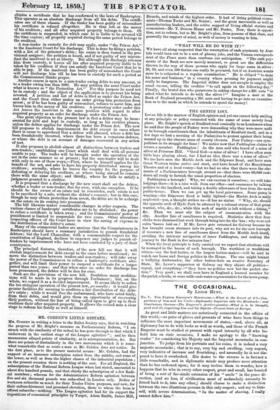THE LORD CHANCELLOR'S BANKRUPTCY AND INSOLVENCY BILL.
Is order to see clearly the effect of the alterations in the law of Debtor and Creditor, proposed by Lord-Chancellor Chelmsford, it will be neces- sary shortly to explain the present law. Persons unable to pay are now divided into traders and non-traders. The traders are dealt with by the law of Bankruptcy, and non•traders by the law of Insolvency. On a trader being made bankrupt his estate is divided by the Court of Bankruptcy among his creditors; and if the conduct of the trader has not been such as to call for punishment at the hands of the Commissioner, he
obtains a certificate that he has conformed to the laws of Bankruptcy. This operates as an absolute discharge from all his debts. The certifi- cates are of three classes. If the trader has been guilty of misconduct his certificate is refused altogether. He is thus left at the mercy of his creditors; and all after acquired property belongs to them. Or the certificate is suspended, in which case he is liable to be arrested till the time expires ; all property acquired during the same period belongs to the creditors.
A non-trader in custody for debt may apply, under "the Prison Act," to the Insolvent Court for his discharge. This is done by filing a petition, with a list of the prisoner's debts ; his estate is then vested in the pro- visional assignee ; the petition is heard, and if not guilty of any miscon- duct the insolvent is set at liberty. But although this discharge releases him from custody, it leaves all his after acquired property liable to be taken by his creditors if they can satisfy the Insolvent Court that he is able to pay. If the insolvent has been guilty of misconduct the Court will not discharge him till he has been in custody for such a period as the Commissioner thinks proper. Another course is open to a non-trader owing debts to any amount, or to a trader owing less than 3001. He may petition the same Court under what is known as "the Protection Act." For this purpose be need not be in custody ; and the object of the application is to prevent his being arrested. A petition and list of debts is filed as under the Prison Act, and the Court then either makes an order giving him protection from arrest ; or if he has been guilty of misconduct, refuses to assist him, and leaves him to the mercy of his creditors. A protecting order under this Act leaves the insolvent in the same position with regard to after acquired property as an order for discharge under the Prison Act. One great objection to the present law is that a debtor may be incar- cerated for debt and kept in custody, as long as his creditor pleases, unless the debtor applies for discharge under the Prison Act. The new bill proposes to abolish imprisonment for debt except in cases where there is cause to apprehend that a debtor will abscond, where a debt has been fraudulently incurred, where there has been a vexatious defence, or where the debt is on account of damages recovered in any action of tort.
It also proposes to abolish almost all distinctions between traders and non-traders ; establishing one Court which shall deal with all persons unable to pay. The trader will be brought under the operation of the act lathe same manner as at present ; but the non-trader will be dealt with only in one of these ways,—First, where he himaplf applies for the benefit of the act, and asks to have his property distributed among his creditors ; secondly, where he leaves the country for the purpose of defeating or delaying his creditors, or where being abroad he remains there with the same object ; and thirdly, where he fails to satisfy a judgment granted to a creditor.
It is proposed that a discharge by the new court shall set the debtor, whether a trader or non-trader, free for ever, with one exception. If he should be the owner of an estate tail in remainder, such estate is not to be sacrificed by a sale, without the debtor's consent ; but in this case, though he may obtain protection from arrest, the debts are to be a charge on the estate on its coming into possession. The bill likewise makes considerable changes in other respects. The various classes of bankrupts' certificates are to be abolished ; the power to refuse a certificate is taken away ; and the Commissioners' power of punishment is limited to suspension for two years. Other alterations respecting officers of the Court have in view the saving of expense in the distribution of the debtor's estate.
Many of the commercial bodies are anxious that the Commissioners in Bankruptcy should have a summary jurisdiction to punish fraudulent debtors • but the Lord Chancellor, with a commendable respect for the constitution of England, declines to empower any judges to punish of- fenders by imprisonment who have not been convicted by a jury of their countrymen.
The principal features, therefore, of the new bill are that it will abolish imprisonment for debt except in the cases before mentioned ; re- move the distinction between traders and non-traders ; will take away the power of the Commissioners to refuse a bankrupt's certificate alto- gether, and will limit their power to suspend a certificate for a longer period than two years ; and that when once an order for discharge has been pronounced, the debtor will be free for ever. Such are the provisions of the new bill. Doubtless many modifica- tions Will be made in its progress through Parliament ; but, on the whole, we regard it as a decided improvement. It seems likely to soften the too stringent operation of the present law, pet sonally ; it would give greater facilities for securing to creditors a fair distribution of the debt- or's estate ; while it would free the embarrassed, who have acted fairly, from their debts, and would give them an opportunity of recovering their position, without the fear of being called upon to give up to their creditors their after acquired property. It allows the ruined man a clear stage to redeem his family as well as himself.



































 Previous page
Previous page